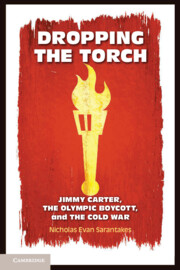Book contents
- Frontmatter
- Contents
- Acknowledgments
- Abbreviations
- Introduction Miracle on Ice
- Chapter 1 Lord Killanin and the Politics of the Olympics
- Chapter 2 Los Angeles versus Moscow
- Chapter 3 Jimmy Carter and U.S.-Soviet Relations
- Chapter 4 The Soviet Invasion of Afghanistan
- Chapter 5 The American Response
- Chapter 6 Easy Victories
- Chapter 7 Painful Losses
- Chapter 8 The White House Games
- Chapter 9 Coca-Cola, NBC, and the Defeat of the Iron Lady
- Chapter 10 The Vote in Colorado
- Chapter 11 Civil Wars
- Chapter 12 Carter versus Killanin
- Chapter 13 Moscow: The Olympics Are the Olympics
- Chapter 14 Los Angeles
- Chapter 15 Conclusion
- Epilogue
- Notes
- Bibliography
- Index
Chapter 14 - Los Angeles
The Olympics Are the Olympics
Published online by Cambridge University Press: 05 September 2012
- Frontmatter
- Contents
- Acknowledgments
- Abbreviations
- Introduction Miracle on Ice
- Chapter 1 Lord Killanin and the Politics of the Olympics
- Chapter 2 Los Angeles versus Moscow
- Chapter 3 Jimmy Carter and U.S.-Soviet Relations
- Chapter 4 The Soviet Invasion of Afghanistan
- Chapter 5 The American Response
- Chapter 6 Easy Victories
- Chapter 7 Painful Losses
- Chapter 8 The White House Games
- Chapter 9 Coca-Cola, NBC, and the Defeat of the Iron Lady
- Chapter 10 The Vote in Colorado
- Chapter 11 Civil Wars
- Chapter 12 Carter versus Killanin
- Chapter 13 Moscow: The Olympics Are the Olympics
- Chapter 14 Los Angeles
- Chapter 15 Conclusion
- Epilogue
- Notes
- Bibliography
- Index
Summary
The repercussions of the 1980 boycott would echo four years later in Los Angeles. In an ironic twist, the crisis that surrounded these games would actually make the Olympic movement stronger than it had ever been. Jimmy Carter, though, would not be around to deal with these problems.
What is remarkable, in retrospect, about Carter’s electoral defeat is not the outcome. That result had been foreordained – or as close to that as is possible in American politics – for over a year. Rather what is amazing is that for a time he managed to make the contest close. Carter was vulnerable on two important issues: the economy and foreign policy. Public discontent was strong enough on either one of these topics that they could have cost him the election in and of themselves.
Back in 1976, Carter and his lieutenants had pursued a campaign strategy that had stressed his status as an outsider – but four years later, he and his staff made a near-perfect about-face. Carter would stand for reelection but he would do little electioneering. The phrase at the time for this approach was a “Rose Garden strategy.” Carter would campaign instead by focusing on his job, avoiding too many overtly partisan efforts, and invoking the power and prestige of his office to rally the American public to his leadership.
- Type
- Chapter
- Information
- Dropping the TorchJimmy Carter, the Olympic Boycott, and the Cold War, pp. 244 - 260Publisher: Cambridge University PressPrint publication year: 2010



